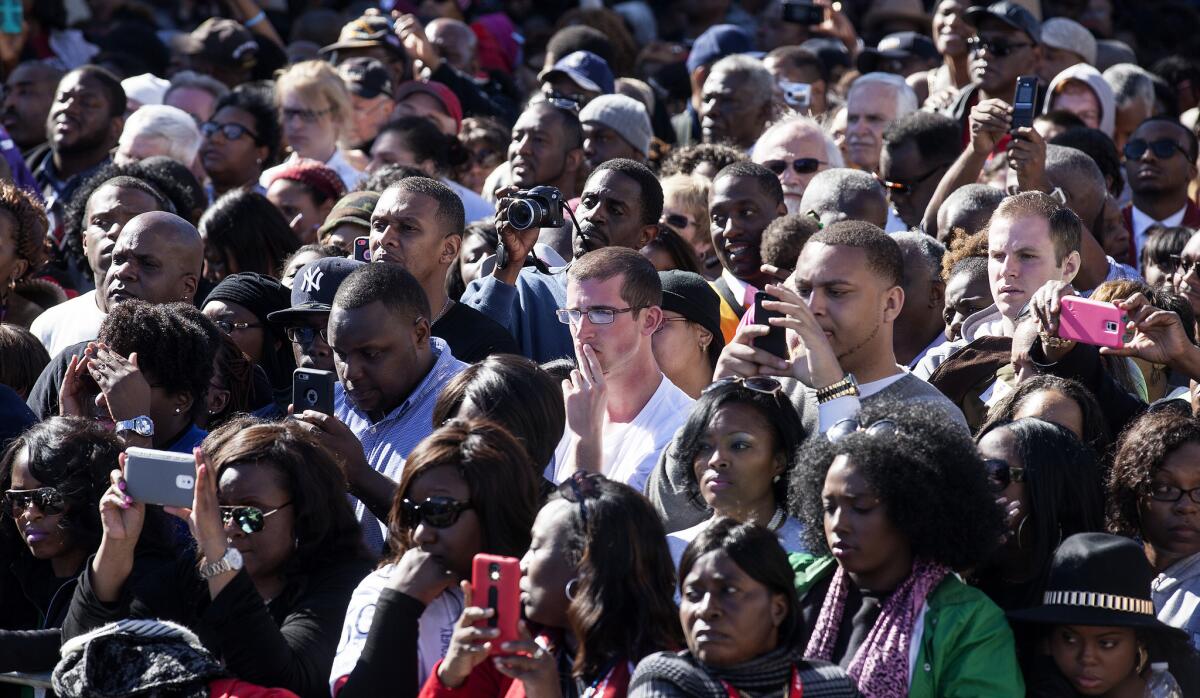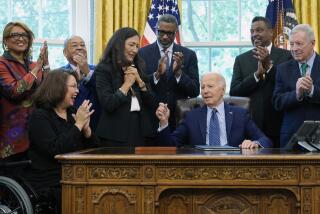In Selma, a chance to hear a president and be a part of history

- Share via
Reporting from Selma, Ala. — There was a sense of euphoria as the crowd dispersed after President Obama’s speech at the Edmund Pettus Bridge, a site of violence and bitterness that had become one of peace and triumph.
George Holmes strode along Church Street, beaming.
“It was inspiring,” Holmes, 68, said of the president’s address on Saturday. “He recognized his race and all other races.”
Holmes said he particularly liked Obama’s use of the bridge as a metaphor for crossing through life and the maturation of the country.
“Fifty years from ‘Bloody Sunday,’ our march is not yet finished, but we’re getting closer,” Obama said. “Two hundred and thirty-nine years after this nation’s founding, our union is not yet perfect, but we are getting closer. Our job’s easier because somebody already got us through that first mile. Somebody already got us over that bridge.”
Holmes, a retired Department of Corrections worker, said he was 18 years old in March 1965 and did not participate in the Bloody Sunday march, although he did take part in demonstrations in his hometown of Birmingham, Ala., where he said racial discrimination “was just as bad.”
And so on Saturday, the 50th anniversary of Bloody Sunday, he came to Selma.
“I didn’t march then, so I wasn’t going to miss history this time,” Holmes said.
A pair from another Alabama city, Magnolia, also came to hear Obama speak. Charles Chapman, 31, walked down the street with his pal Harold Boulers, 21.
“He encouraged all of us to rise up and fight for equal opportunity and justice,” said Chapman, adding that he was buoyed by the president’s focus on an inclusive message.
The wide-ranging speech mentioned a diverse set of characters — Susan B. Anthony, James Baldwin, Lewis and Clark, gay activists and the Navajo code-talkers among them — and was peppered with references to significant sites in American history.
“Many are sites of war -- Concord and Lexington, Appomattox, Gettysburg. Others are sites that symbolize the daring of America’s character -- Independence Hall and Seneca Falls, Kitty Hawk and Cape Canaveral.
“Selma is such a place. In one afternoon 50 years ago, so much of our turbulent history -- the stain of slavery and anguish of civil war, the yoke of segregation and tyranny of Jim Crow, the death of four little girls in Birmingham, and the dream of a Baptist preacher -- all that history met on this bridge. It was not a clash of armies, but a clash of wills; a contest to determine the true meaning of America,” Obama said.
Another of his listeners was 80-year-old Janet Riley. Riley, who is white, said she was in Selma 50 years ago and participated in some demonstrations, but not Bloody Sunday. Her husband used to drive the truck transporting portable toilets to the marches, she said.
Riley traveled from Indianapolis with her husband, daughter and grandchildren to hear Obama in person.
“That was an effective speech,” she said. “I was impressed by the president talking about a great range of things, including all the people who are usually left out.”
For Selma resident Danielle Wooten, 30, it was also the timeliness of Obama’s message that hit home.
“He said everything right,” Wooten said. “It was very appropriate for what’s going on in America. It was very inspiring. It was real.”
Frederique McGirt, a French teacher, accompanied a group of students from the Atlanta International School and the Coretta Scott King Young Women’s Leadership Academy to hear Obama’s speech.
“The students come from everywhere, but we want them to understand the local history and what it means for us now,” McGirt said. “It is very important for them to know.”
A running theme in the president’s speech — and in workshops held throughout the weekend — was handing off the battle for civil rights to a younger generation. That theme was evident in the crowds of old and young people together throughout Selma.
Linda Kinlaw had driven from Madison, Ala., with her 3-year-old granddaughter, Rian.
“When I was her age, I wanted to march,” said Kinlaw, 57. “I want her to experience what I really wanted to experience. This trip is not just for me. I want her to experience this.”
Twitter: @AMSimmons1
More to Read
Sign up for Essential California
The most important California stories and recommendations in your inbox every morning.
You may occasionally receive promotional content from the Los Angeles Times.











